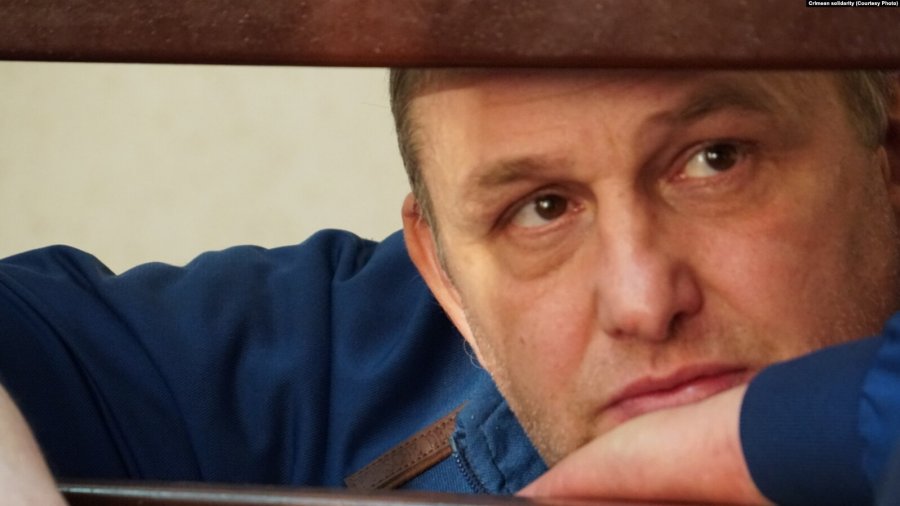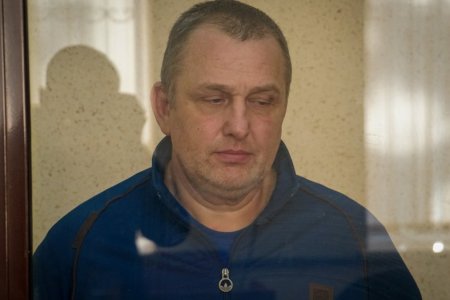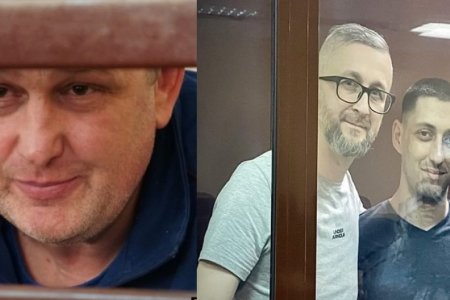
The Russian occupation ‘Crimean High Court’ has knocked one year off the politically motivated 6-year sentence against Ukrainian journalist Vladislav Yesypenko, with the reason of quite staggering cynicism. The ‘court’ ignored Yesypenko’s retraction of the ‘confession’ he made while held illegally without access to an independent lawyer, and his detailed account of the savage torture to which he was subjected. It did, however, reduce the sentence to five years because, it claimed, the ‘testimony’ obtained with the use of electric shocks and savage beating had “actively helped solve the crime”.
In making such an extraordinary claim, the ‘court’ also ignored the fact that Yesypenko had ‘confessed’ to other ‘crimes’ (spying for Ukraine’s SBU, or Security Service) with which he was later not charged. There is no legitimate explanation for why the FSB should have claimed on 16 March to have thwarted Yesypenko’s “spying and sabotage activities for SBU’ and Yesypenko should have been shown ‘confessing’ to this on Russian-controlled television, only for this to vanish from the indictment. Such a discrepancy is further confirmation of Yesypenko’s own repeated account that he was told what he must say on video or face more torture. It is possible that the publicity elicited by Russia’s arrest of a freelance journalist who was in occupied Crimea on a job for Radio Free Europe – Radio Liberty [RFE/RL] prompted the FSB to give up on the spying charges, especially since the actual activities initially described by the FSB were those of any journalist. Yesypenko was said to have “taken photos and video footage of infrastructure and places where there are a lot of people in the republic of Crimea”.
It is certainly easier to fabricate charges based on a grenade allegedly ‘found’ during an unexplained search, though even here the ‘evidence’ was quite incredibly shoddy. During one of the hearings, for example, the defence was able to physically demonstrate that the grenade and detonator did not fit in the ammunition pouch, and that this pouch, in turn, did not fit in the glove compartment where the FSB officers claimed to have found it. None of these items had Yesypenko’s fingerprints on them.
Yesypenko was preparing material for RFE/RL’s Crimean Realities when he was stopped by traffic police on his way to Simferopol on 10 March 2021. The FSB then turned up and forced Yesypenko to the ground because carrying out the ‘search’ which purportedly uncovered the grenade. The FSB has never provided any explanation as to why they became involved at all.
Yesypenko was taken to some basement where he was undressed, thrown to the floor and had wires attached to his earlobes. An electric current was then switched on, with the pain intolerable. Yesypenko says that when, at some point, his torturers understood from the reduced intensity of his screams that he was becoming accustomed to the pain, they increased the voltage. Between bouts of torture, they fired questions at him, demanding that he confess to working for Ukraine’s security service, etc. If they didn’t like his answers, the torture would resume. He was also kicked if he stopped doing the push-ups they also demanded.
At some point he signed the papers they thrust in front of him and was also forced to take part in a farcical ‘interview-confession’, saying that he had spied for the SBU.
The FSB prevented him from seeing a proper lawyer for around a month, almost certainly to ensure that the torture marks were not formally recorded. It was only during the first hearing, on 6 April, that the journalist was able to formally reject the services of the ‘lawyer’ foisted on him, Violetta Sineglazova and state that he wished to be represented by independent lawyers. He also described to the court the torture that he had been subjected to, with the FSB having told him that they would “work him over until he croaked it”.
The indictment contained only two charges: the lesser one (under Article 222.1 of Russia’s criminal code) of possession of an explosive, and the much more serious charge (Article 223.1) of ‘preparing or adapting an explosive’.
Despite the FSB’s illegally depriving Yesypenko of independent legal aid during the period in which he made his so-called ‘confession’; his retraction and account of the torture he endured and the material evidence contradicting the FSB's claims, ‘prosecutor’ Yelena Podolnaya demanded an 11-year sentence. On 16 February 2022, ‘judge’ Dlyaver Berberov from the Russian occupation Simferopol District Court sentenced Yesypenko to six years imprisonment (in a medium-security prison colony). He also imposed a fine of 110 thousand roubles. It was this sentence that, at appeal stage on 18 August, was reduced by one year.



